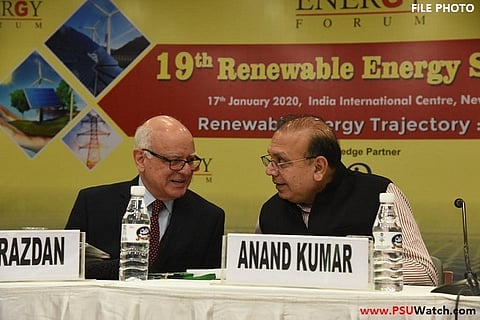
- News Updates
- PSU Watch
- Defence News
- Policy Watch
- हिन्दी न्यूज़
- Jobs Watch
- States News
- Event News

New Delhi: Former Secretary of Ministry of New and Renewable Energy (MNRE) Anand Kumar said on Friday that if India is to install 175 GW by 2022, 225 GW by 2024 and 450 GW by 2030, the country definitely cannot depend on imports of renewable energy (RE) equipment and must not shy away from investment in the manufacturing sector. "Because if we do, it will definitely harm our energy security and the security of the nation. And that is why we have to be self-sufficient and we have to be Atmanirbhar in the energy sector," said Kumar while addressing a session on Atmanirbhar Bharat at RE-Invest 2020 on Friday.
India has a capacity of around 10 GW in wind sector and 3 GW for solar cells. "After we finalise the manufacturing tender, we hope to get additional 3GW of solar cell capacity, and additional 3 GW of solar module capacity," said Kumar.
"We should not only cater to the domestic requirement. We should become a regional hub. We should cater to the region. And we should not only look after the energy security of the country, but after the energy security of the region while developing economy of the region, along with the Indian economy. And if we become a regional hub, we will be able to draw the power of scale," said the bureaucrat, who served as Secretary in the MNRE from June 2017 until April 2020. Kumar is currently Secretary of the National Commission for Backward Classes.
While pointing out that India is going to have a huge demand of 450 GW by 2030 in line with the government's target, Kumar said that the figure should encourage investors to invest in India for setting up manufacturing capacities. "For setting up 450 GW by 2030, we would require 10 GW of wind, 20 GW of solar capacity addition every year up to 2024. And later on, maybe 10-15 GW of wind and around 30 GW of solar capacity addition every year between 2024 and 2030. If we have this demand, we should not hesitate to invest in India for setting up manufacturing capacities," he said.
"We must provide easy finance, land, continuous electricity for the manufacturing of solar cells and modules, wafers and silicon. We must provide water. And we must allow import of raw material at no import duty. We must facilitate value addition," said Kumar.
Commenting on the nature of incentives required by the industry, Kumar said, "We definitely require incentives for manufacturing since it is capital-intensive in nature. But once we have set up the manufacturing setup for the RE industry, we must protect it by providing safeguard duty, by imposing basic custom duty, introducing non-tariff barriers like preparing a list of manufacturers who can supply within the country."
(PSU Watch– India's Business News centre that places the spotlight on PSUs, Bureaucracy, Defence and Public Policy is now on Telegram. Join PSU Watch Channel in your Telegram and stay updated)
